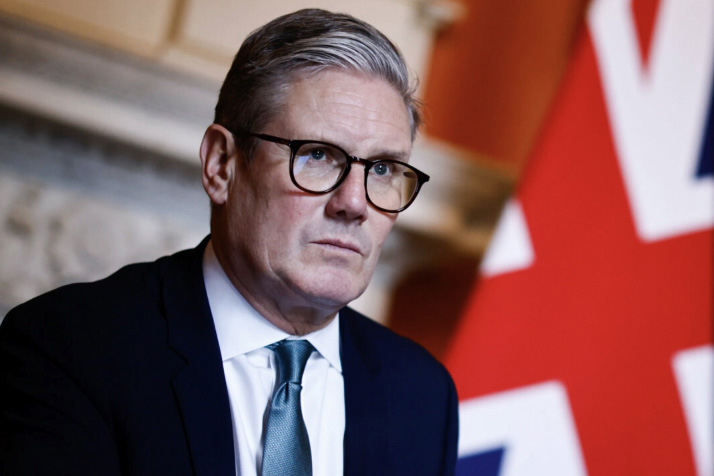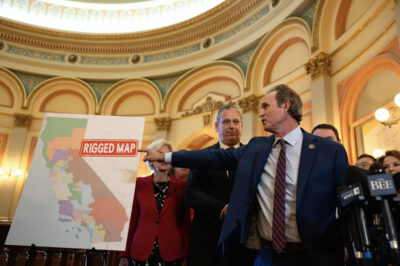By Ryan Morgan
Contributing Writer
British Prime Minister Keir Starmer on Tuesday announced his government would recognize a Palestinian state by September unless Israel agrees to a cease-fire and to improve humanitarian conditions in the Gaza Strip.
In a Tuesday press statement, Starmer said the United Kingdom has long supported a plan to eventually recognize a Palestinian state, and said such a state is “the inalienable right of the Palestinian people.”
He also said Palestinian statehood is essential for Israel’s long-term security.
The British prime minister specifically said the UK will proceed with recognizing Palestinian statehood at the United Nations General Assembly “unless the Israeli government takes substantive steps to end the appalling situation in Gaza, reaches a ceasefire, makes clear there will be no annexation in the West Bank, and commits to a long-term peace process that delivers a two-state solution.”
The fighting began after Palestinian terrorist group Hamas’ Oct. 7, 2023, attack on southern Israel left around 1,200 dead and 251 abducted.
British Foreign Secretary David Lammy reiterated Starmer’s announcement in a speech before the United Nations moments later on Tuesday afternoon.
He further called upon the international community to live up to past resolutions in support of the so-called two-state solution to address the Israeli-Palestinian conflict.
“Countless times, this assembly and the Security Council have proclaimed that there must be a two-state resolution,” Starmer said. “Resolution after resolution. Resolution 181, Resolution 242, Resolution 446, Resolution 1515, Resolution 2334.
“These cannot be just numbers on a page, but the conviction of a deeply frustrated world.”
Starmer’s threat to recognize Palestinian statehood comes less than a week after French President Emmanuel Macron announced his government will do so when the U.N. General Assembly meets in September.
Some 146 U.N. member states already recognize Palestinian statehood, according to the U.N. Office of the High Commissioner for Human Rights.
The Israeli Foreign Ministry said in a Tuesday X post that Starmer’s threat rewards the terrorist group and delays peace.
“The shift in the British government’s position at this time, following the French move and internal political pressures, constitutes a reward for Hamas and harms efforts to achieve a ceasefire in Gaza and a framework for the release of hostages,” the Israeli ministry said.
Israel and Hamas reached a cease-fire agreement in President Joe Biden’s final days in office. Biden said the truce was a three-stage process that would eventually lead to the end of the Gaza conflict.
The cease-fire fulfilled the first part of Biden’s three-phase framework, but the truce collapsed in March amid disagreements about the next steps. Israeli negotiators backed a proposal to extend the phase-one cease-fire conditions. Meanwhile, Hamas negotiators sought to move on to the second phase, which would’ve required the complete withdrawal of Israeli forces from Gaza in exchange for the return of all living hostages still held by Hamas.
U.S. special envoy to the Middle East Steve Witkoff initially planned to attend a new round of peace talks with Hamas earlier this month, before pulling out and saying Hamas showed “a lack of desire to reach a ceasefire in Gaza.”
Responding to Starmer’s announcement, President Donald Trump said a push for a two-state solution now would come as a reward to Hamas after its terrorist attacks.
“I am not in that camp because if you do that, you really are rewarding Hamas,” he told reporters aboard Air Force One.
There have been several recent calls among the international community for Israel to improve protections for noncombatants in Gaza and bring the conflict there to a close.
Following the Oct. 7 attack, Israeli forces have surrounded and bombarded the Gaza Strip and sent ground forces through the territory to eradicate Hamas and win the return of hostages taken during the terrorist attack.
Gaza’s Ministry of Health, which operates under Hamas’ political control over the Gaza Strip, has reported more than 60,000 people killed since Oct. 7, 2023.
The ministry does not differentiate between civilians and combatants in these casualty figures, but said that more than half of those killed include women, children and the elderly.
Exact casualty assessments cannot be independently verified at this time.
This month, the governments of the United Kingdom and 30 other countries issued a statement criticizing the Israeli government’s model for humanitarian aid distribution in Gaza and calling for it to end the conflict.
They also condemned Israeli plans to expand settlements in the contested West Bank.
Last week, more than 100 international aid organizations, including Doctors Without Borders and Oxfam, also signed a statement raising concerns about growing starvation in Gaza and the risk of aid seekers being gunned down as they approach the few functioning aid distribution sites within the embattled territory.
On Saturday, the Israeli military announced some new steps to improve the flow of humanitarian aid into Gaza, including the resumption of aid air drops, the opening of overland aid delivery corridors, and a willingness to implement pauses in combat operations.
Trump has also called on the Israeli government to do more to address the humanitarian conditions in Gaza.
While meeting with Starmer in Scotland on Monday, the president said feeding the people of Gaza should be Israel’s top priority.
Israeli Prime Minister Benjamin Netanyahu also recently said reports of the aid situation in Gaza were exaggerated and biased against Israel.
“Israel is presented as though we are applying a campaign of starvation in Gaza. What a bald-faced lie. There is no policy of starvation in Gaza, and there is no starvation in Gaza,” Netanyahu said on Sunday.
Israel’s military arm, the Coordinator of Government Activities in the Territories, accused the international groups of overlooking the large influx of aid during the hostage-release deal and omitting Israeli-supplied data and significant improvements in aid delivery, such as expanded crossings, airdrops, field hospitals and private sector contributions.
Israel has also accused Hamas of worsening humanitarian conditions in Gaza and diverting aid meant for Palestinian civilians to its terrorist operations, which the group denied.
Evgenia Filimianova contributed to this report.








